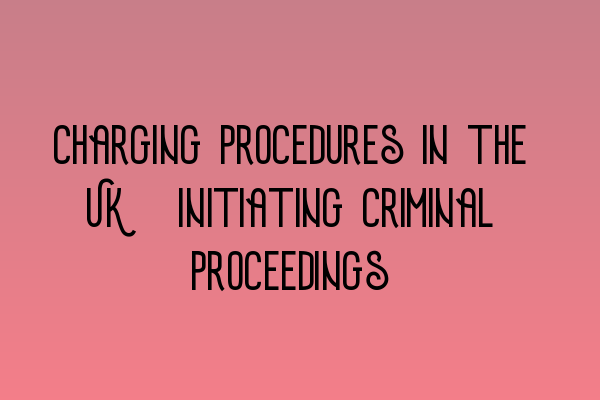Charging Procedures in the UK: Initiating Criminal Proceedings
When it comes to criminal cases, charging procedures play a crucial role in initiating criminal proceedings in the UK. Understanding the process is essential for both aspiring solicitors preparing for the SQE exam and individuals navigating the legal system. In this article, we will delve into the details of charging procedures and shed light on how criminal proceedings are initiated.
What are Charging Procedures?
Charging procedures refer to the process by which someone is formally accused of committing a criminal offense. It involves the decision-making process of the prosecutor to charge an individual and initiate criminal proceedings. This is a crucial step in the justice system, as it marks the beginning of a legal case.
The Role of the Crown Prosecution Service (CPS)
The Crown Prosecution Service (CPS) is responsible for making charging decisions in England and Wales. The CPS reviews evidence gathered by the police and determines whether there is enough evidence to proceed with a prosecution. They consider factors such as the strength of the evidence, public interest, and the Code for Crown Prosecutors.
The Code for Crown Prosecutors sets out the principles that guide the CPS in making charging decisions. It emphasizes the need for evidence that is credible, reliable, and admissible in court. Prosecutors must also assess whether the evidence is in the public interest. This means considering factors such as the seriousness of the offense, the impact on the victim, and the defendant’s criminal history.
Offences that Require Charging
Not all offenses require formal charging procedures. Minor offenses, such as speeding or littering, are typically dealt with by issuing fixed penalty notices or cautions. However, more serious offenses, such as murder, robbery, or drug trafficking, require formal charging and the initiation of criminal proceedings.
Once the CPS determines that there is sufficient evidence to proceed, they will charge the individual with the relevant offense. The charge is then brought before a magistrate’s court, where the defendant will have their initial hearing.
The Initial Hearing
The initial hearing, also known as the first appearance, is a critical stage in the criminal proceedings. It is during this hearing that the defendant is formally informed of the charges against them. The court will also consider bail and any conditions that may be imposed on the defendant while awaiting trial.
At the initial hearing, the defendant should be represented by a solicitor who can advise them on their legal rights and options. Aspiring solicitors should be well-versed in the procedures and requirements of the initial hearing, as it is a fundamental aspect of criminal law in the UK.
Conclusion
Understanding charging procedures is essential for anyone involved in criminal law, from aspiring solicitors studying for the SQE exam to individuals facing criminal charges. It is the starting point of a criminal case and involves the decision-making process of the CPS to charge an individual and initiate proceedings. Knowing the role of the CPS, the offenses that require charging, and the importance of the initial hearing provides a solid foundation for navigating the complexities of criminal law in the UK.
For more information on related topics, check out these articles:
- SQE Exam Prep: Essential Study Materials for Aspiring Solicitors
- Demystifying the Solicitors Qualifying Examination Format
- SQE Exam for International Lawyers: Challenges and Success Strategies
- LLC Formation Made Simple: Step-by-Step Guide for UK Entrepreneurs
- LLC Formation: A Step-by-Step Guide for UK Entrepreneurs
